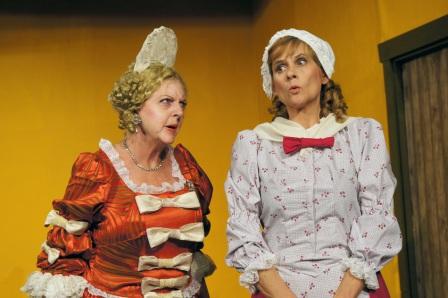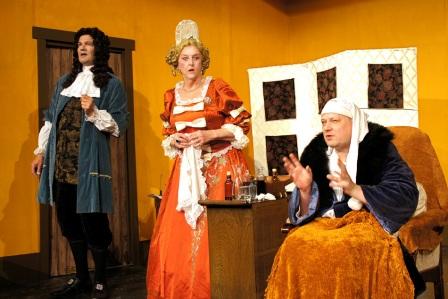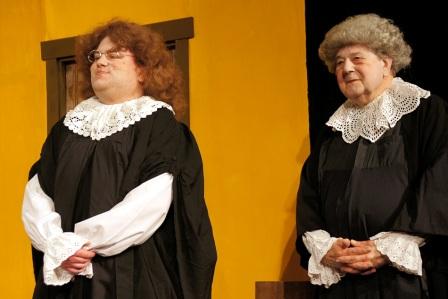|
|
|||||||||||||||||||||||||||||||||||||||||||||||||||||||||||||||||||||||||||
Click
here for more pictures of this play |
|||||||||||||||||||||||||||||||||||||||||||||||||||||||||||||||||||||||||||
|
|||||||||||||||||||||||||||||||||||||||||||||||||||||||||||||||||||||||||||
|
Click here for the
NODA crit for this play |
|||||||||||||||||||||||||||||||||||||||||||||||||||||||||||||||||||||||||||
|
The Imaginary Invalid Jean-Baptiste Poquelin only lived for 51 years and ironically died during a production of his Le Malade Imaginaire suffering from pulmonary tuberculosis, It’s good to see that Iain Howland lives on to tell the tale! He was considered to be one of the greatest masters of comedy in Western literature, that’s Molière and not Iain, but he did come an amazing second for an impressive and well deserved leading role Having lost his mother at the age of 10 and not apparently having a particularly close relationship with his father. I think one can understand why this was reflected in the many male chauvinistic behaviours within Molière’s main characters and his clear intention of humour and loving chaos with plays written with such family values. In L’Écolle des Femmes - Arnolphe, the main protagonist, grooms Agnès with the intention that she will be too ignorant to be unfaithful to him The Imaginary Invalid was performed with success in Loughton on Saturday evening’s final night. With football fever in the air and England’s imminent first world cup game, the box office and team LADS drummed up a very healthy audience. It was a hot evening with dreadfully uncomfortable seats and quite a lot of audience were fidgeting. The acting in this production fortunately interested me sufficiently to forget the small comfort issues, save for the individual who took a phone call in the second half and freely chatted and the couple who constantly kissed and cuddled through the performance without any consideration for the people behind. When the curtains opened, I got the distinct reminder of ‘A Funny Thing Happened on the Way to the Forum’ with a Scrooge twist. Iain Howland’s character, Argan, began with wit and complaint. At times, he paid more than a passing homage towards Harry Enfield’s ‘Old Gits’ sketch, giving the audience a great taste of Argan’s attitude towards selfishness and the flavour of Molière’s other male dominated plays. Then, in strutted the confident maid Toinette, played beautifully by Karen Rogers, who offered Argan an almost motherly defiance, knowing him better than he knew himself. The rapport between the two was slick and very amusing, including smooth interaction and eye contact with the audience. Anjelica, acted by Lorna Redburn, entered a little stiff at first but warmed quickly as she discussed love with Toinette. There was a great arguing moment between Father and Daughter as they realise they are discussing different beaus. Argan’s line of the scene is “don’t call me dear !” and this added to the compliment of cushion throwing as he screams “get out slut !” Eileen Stock enters as the glamourous wife, Béline, doting and pampering calling him ‘pettykins’. She cleverly worked with the audience getting across her ulterior motive of desire for his money. “You said get a clever lawyer”, she exclaims, introducing Howard Platt as Monsieur Bonnefoy, who eloquently delivers with smooth and precise solicitor style waffle, clearly having desires of passion for Argan’s wife. Argan’s body language and eye contact with the audience as Bonnefoy exudes verbiage is amusing. Once Argan exits, the conversation did become a little sticky between barrister and wife but their ability to cover this was quite seamless. I would like to mention the keyhole peeking scene with Toinette, it sadly lacked the finesse it really needed and I think this was due to the door not having a proper catch. When Tom Donoghue entered as Cléante, the lover, there was an air of awkwardness between him and Toinette, as he set the scene for pretending to be Angélique’s music teacher. When Argan returns, the repeated stepping actions across the stage were a little unnecessary and laboured prior to realising Cléante is in the room. This does not stop Argan claiming his daughter and his physician’s son are “to be married at thwonce !!!”. When Roger Barker and Nick Martin enter as Dr Diaforus and Dr Thomas Diaforus respectively, there is a wonderful stage rapport and particular credit to the directors for the clear control on timings, audience inclusion and sharing the rolling eyes as gushing words are disgorged whilst the doctor paces beautifully around the stage When Cléante quotes his shepherd to shepherdess words and sets them to music, I must compliment both Tom on his ability to present his lament and Lorna for her beautiful voice. I would like to mention the heads rocking back and forth from Iain and Karen and the Dr Falling asleep provided a great end to the first act with another Argan rant “she’s a Hussy !!” After a welcome interval with great front of house presence and a friendly refreshment team, the second half began with the introduction of the poor youngest daughter, Louise. After a slightly sticky start, she falls into a brilliant role; getting smacked by her father and receiving a round of applause for a brilliant stage faint and then a very amusing stage chase. Phil Postings takes the role of Argan’s brother, Monsieur Béralde, and in this difficult role does struggle a little with some fluency but very tactfully gets round this with use of hand movements to act as a catalyst. Phil is a little jittery with his words in this scene but it is soon forgotten when Argan forgets his stick and the clever mention of Molière in this, Miles Malleson’s adaption, is noteworthy. Martin Howarth enters as The Apothecary, Monsieur Fleurant with good annoyance when Argan refuses his medicine. Foster Barnet plays the role of Dr Purgon who also slips a bit with some words but the scene is quite smoothly completed. Other Molière plays are reputed to tire at this stage, which is why they are often split into three acts and acted with verse. Toinette broke this slight monotony with the costume changing behind the screen, which definitely lifted the audience spirit. I loved the line “ I have cured every known disease . . . . and several others !” There were a few stuttered lines in this section of the play but Argan notably assists these and blends them in. Argan played dead very well, especially whilst scratching his leg. Bravo for the Maid. In this adaption a group of doctors visit to invite Argan into the medical profession and the latin chanting was very good, particularly noting ‘Honi soit qui mal y pense’, which ironically and pleasingly is the anglo-norman phrase to a song which I have written for another play ! May I just mention the ending was rather louder and more forceful than probably needed (but I do appreciate, after a long and very demanding play, that it is with understandable relief that the group come together to say goodbye. In other adaptions, Argan is killed off and the doctors change their head gear for death masks but it is fortunate that Loughton’s cast all remained very much alive and intact to tell the tale ! I appreciate the difficulties producing a Molière play, set in such austere times and trying to create an interesting scene without modern props. I think the stage team did a good job of this. Yellow walls gave a bright backdrop, so well done Stephen Radley (can I suggest definite closing doors, especially on the inevitable opening at Toinette’s eavesdropping ??) I did feel the same lighting in all scenes did slightly tire the audience’s eye and as the play progressed a small amount of alteration could have made the house re-adjust their concentration a little more, especially as the second act came to its ultimate dénouement but Dean Bartholomew did a great job of overseeing this, along with the piped Harpsichord music which came in whilst Cléante lamented. Sylvia Zilesnick was needed on occasion but this was quite understandable judging by the fast script. Howard Platt, Frances Chalkwright, Christine Eckley and Hannah Southgate provided all necessary for props and costume. I would like to thank you for allowing me to crit this production and compliment all concerned on an outstanding effort with a very challenging play. I have been fortunate to attend a number of LADS productions and must credit your team for excellence in fast moving dialogue. Well done Wendy Butler, Mary Lowe and your brilliant direction for the cast one and all ! Concluding about the impact Molière had on parisian theatre, In La Critique de "L'École des femmes", in which he imagined the spectators of his previous work showing them at dinner after watching the play; it addresses all the criticisms raised in real life about l’ecolle des femme and he ignorantly presenting the critics' arguments and then repudiates them. This was the so-called Guerre comique (War of Comedy) - I would suggest a clever writer amongst yourselves ought to make a play of this critique de LADS and, of course, I shall expect you to get Daniel Craig to play my part !!! Mark Brown Private Music Teacher, Voice Coach and Musical Director Get Musical Group |
|||||||||||||||||||||||||||||||||||||||||||||||||||||||||||||||||||||||||||



